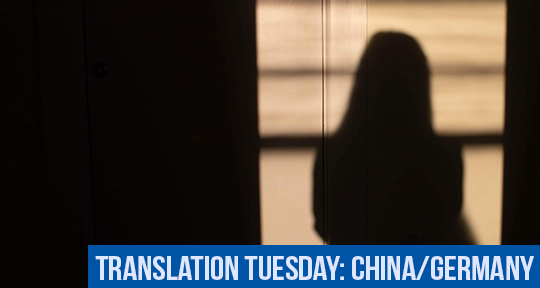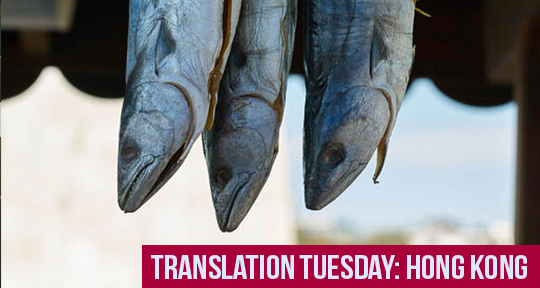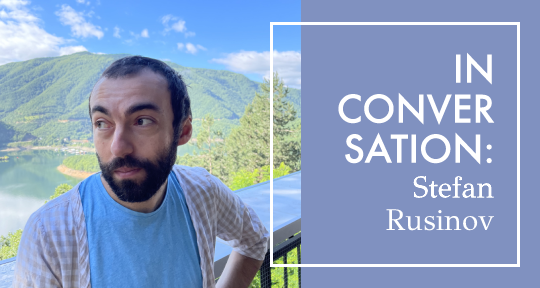“Lazy to shake the white fan, nude in green woods . . .” The languorous summer words of Li Bai are perhaps demonstrative of these mild months, but even a writer too lethargic to fan himself is still scrawling poems. The pen never rests, as proved by a bounty of literary news from Bulgaria, Sweden, and Hong Kong this week, as our editors report on book fairs, awards, and festivals. Read on to find out more!
Andriana Hamas, Editor-at-Large, reporting from Bulgaria
It is a truth universally acknowledged that books—with their magical power to still the world and inspire us in previously unimaginable ways—can transform the course of human lives for good, and this seems especially obvious when it comes down to interpersonal relationships, especially the queen of them all—love. The recently organized Bulgarian literary festival Пловдив чете (Plovdiv reads) demonstrated that by uniting fiction and the deep appreciation of others, resulting in a happy collaboration.
On the last day of the tightly packed program, which included an afternoon poetry reading under the blooming linden trees by the up-and-coming authors Aleksandar Gabrovski, Dimitar Ganev, Gabriela Manova, and Liliya Yovnova, a rather nervous young man from the public stood up and, under everyone’s curious gaze, asked his speechless girlfriend for her hand in marriage. Once it was established that a “happily ever after” was soon to follow, the audience was assured that the world would continue to spin—possibly in patterns that, more often than not, rhyme.
Hosts of this particular occasion were one of the country’s best-renowned writers Georgi Gospodinov (whose verse is available in Asymptote’s pages!) and the talented poet, essayist, and screenwriter Ivan Landzhev. Both shared their fascinating insights into the qualities required of a helpful editor, the art of mentoring gifted adolescents without erasing their unique personalities, as well as the importance of authors reading each other. Another point that was touched upon was the ability to trace foreign influences in one’s works.
Alas, for even more thrilling discussions of this sort, we’ll have to wait until the 2022 edition. Until then, however, let us enjoy the rest of what global literature has to offer!
Eva Wissting, Editor-at-Large, reporting from Sweden
This month, Swedish writers Elin Anna Labba and Alma Thörn have been awarded the Norrlands litteraturpris—a literary prize of northern Sweden. The prize has been given annually since 1973 by a literary association of the region, Norrländska litteratursällskapet, along with the region’s writers’ organization, Författarcentrum Norr. Since 2014, there have been two categories: adult literature and children’s literature. For this year’s edition of the adult category, Swedish Sámi journalist and writer Elin Anna Labba was awarded for her nonfiction book Herrarna satte oss hit: Om tvångsförflyttningarna i Sverige (Sirdolaččat: The Deportation of the Northern Sámi). The jury’s statement pointed to how Labba has woven a literary fabric—oral testimonies, archived documents, yoiks, maps, and photographs that highlight the state abuse and colonial exercise of authority previously made invisible in Nordic history, and calls her book a hybrid that reveals the possibilities of literature. In the children’s book category, Alma Thörn is awarded for the graphic novel Alltid hejdå (Always Goodbye). Thörn’s book is about divorce from a child’s perspective, which the jury deemed “a visually and emotionally strong story.”
Another recent book that calls attention to serious issues is Dansa med corona (Dance with Corona) by the staff of the care home Östergård 2 in Kristianstad. Last year, media frequently wrote about the place, which was one of the first care homes in southern Sweden to be struck by COVID-19. Now, the staff are sharing their own experiences through the recent publication: “Your children beg you to stay home from work because they believe you will die if you go there. Media depict you as the executioner and your friends flee when they see you. At the same time, the elderly need you at work to survive.” The book gives precious insight into the life of the caretakers during extreme times, with guilt and fear as only a couple of the challenges they have had to manage.
Charlie Ng, Editor-at-Large, reporting from Hong Kong
Having been suspended due to the COVID-19 pandemic in 2020, the Hong Kong Book Fair returns this year with the theme “Inspirational and Motivational Reading,” running from June 14 to 20 at the Hong Kong Convention and Exhibition Centre in Wan Chai. Besides collaborating with numerous publishers to showcase new books in Chinese and English, the organizer also invited famous local and international writers to participate in talks and workshops, including Neil Gaiman and Julia Lovell. However, with the introduction of the national security law, Hong Kong’s publishing sector is overcast by the anxiety over tightened freedom of speech and expression. As reported by the Hong Kong Free Press, the Hong Kong Trade Development Council announced that police would be notified should they receive complaints on exhibits that breach the national security law. This warning is among a series of censoring actions taken against oppositional voices, including the forced closure of the Apple Daily newspaper and the removal of some political books from public libraries.
Despite the tense political situation in Hong Kong, Hong Kong literature is varied enough to represent Hong Kong in different ways. In a recent interview published by Words without Borders, Louise Law, the director of Spicy Fish Cultural Production Limited and publisher of the local literary magazine Fleurs des Lettres, speaks to translator Jennifer Feeley on Hong Kong’s literary scene and the translation of Hong Kong literature. Feeley is a major translator of the works of Xi Xi, and her translation, Not Written Words: Selected Poetry of Xi Xi, was a prizewinning collection. Zolima CityMag’s recent Hong Kong’s Great Writers series also highlights Xi Xi as their second feature. The article introduces Xi Xi’s literary life and explores the playfulness in her characters as well as her literary style.
*****
Read more on the Asymptote blog:









